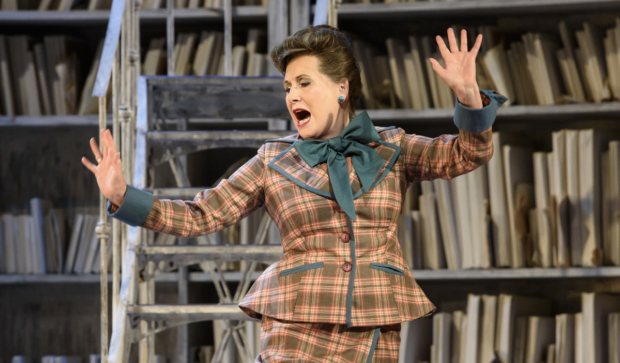Review: Il barbiere di Siviglia (Glyndebourne and tour)
Glyndebourne’s 2016 production of Rossini’s comic opera revived for the autumn tour

© Bill Cooper
It’s only the first revival but Annabel Arden‘s production already looks stale. Sight gags that had a street-theatre appeal in 2016 now seem overworked as Rossini’s elegant Beaumarchais-and-buffo comedy struggles to accommodate the director’s mod-clown sense of humour. For whereas Jonathan Miller’s classic ENO production – currently enjoying a top-notch revival at the London Coliseum – revels in unearthing the fun within, Arden prefers to impose her own version of jollity.
Her production comes saddled with a bleak, abstract set that doesn’t have a funny bone in its body, so the first job of any company – as happened last year – is to counter Joanna Parker‘s ugly motifs, dull blues and weird airborne spores with some zinging performances. Alas, in Sinéad O’Neill‘s revival Glyndebourne‘s genius for casting has eluded it, with workaday replacements for WhatsOnStage Opera Poll nominees Taylor Stayton (Almaviva) and Björn Bürger (Figaro) who lack swagger and bonhomie.
Tenor Jack Swanson, a boyish, slightly pallid Count, sings with a sweet tone but does not yet have the full measure of Rossini’s athletic vocal runs, while his fellow American Tobias Greenhalgh as the resourceful barber is insufficiently lithe of gesture or spirit to dominate such a physical staging. There are no complaints about the sound either of them produces – they are excellent singers – but in opera that is only half the story.
The Barber of Seville, a prequel to The Marriage of Figaro, is based on an 18th-century French comedy in which the course of true lust never runs smooth. Drawing freely on the Italian Commedia dell'arte tradition, it explores Count Almaviva’s courtship of young Rosina, who is confined indoors by her guardian, the predatory Doctor Bartolo. With the aid of the local hairdresser, and by dint of some cunning disguises, love prevails.
The production has undergone a little streamlining ahead of its first tour. Gone are Don Basilio’s combustible cassock (a shame) and Rosina’s spuriously interpolated second-act aria (a relief), but set pieces like the infestation of harpsichords remain and, on the evidence of this second performance, continue to prompt chuckles.
Janis Kelly is the sole returning principal, and her witty singing and nifty footwork as the maid Berta earned the evening’s loudest round of applause. Marco Filippo Romano is a young but impressive Bartolo who rattled off the rapid patter with such aplomb that every word carried perfectly, while the men of the Glyndebourne Chorus were a credit to their new chorus master, Nicholas Jenkins. Antoli Sivko‘s Don Basilio, though, was too lightly sketched to make much of an impression.
Ben Gernon conducted Rossini’s arias at elegant tempos, but his laborious way with the recitatives seemed more inspired by Parker’s set than by Rossini’s wit, and thus failed to help the admirable mezzo Laura Verrecchia (as Rosina) to lighten a voice whose dark hues would surely be more at home in the composer’s sombre dramas.
Il barbiere di Siviglia continues in repertory at Glyndebourne until 28 October, then tours to Canterbury, Woking, Norwich, Milton Keynes and Plymouth until 2 December.













